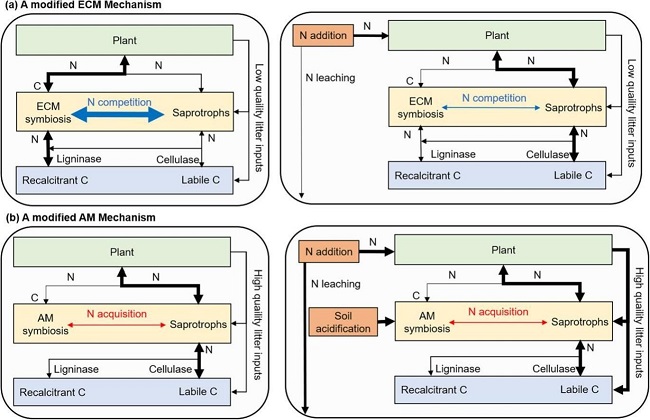Crucial Impacts of Mycorrhizal Associations on Soil Carbon-degrading Enzyme Activities and Soil Carbon Dynamics under Enhanced Nitrogen Deposition Revealed
【Release time:25-Oct-2024
】【Data source:IEECAS】
Excessive nitrogen (N) deposition from human activities has continuously increased over the past decades, which strongly affects soil organic carbon dynamics of terrestrial ecosystems. Soil microorganisms play a key role in regulating soil organic carbon dynamics under N deposition, while the complex underlying mechanism limits the inclusion of microbial mechanisms in global soil organic carbon cycle models.
Moreover, measurements on soil microorganisms are also time-consuming, costly, and involve strict requirements regarding laboratory equipment and storage conditions of soil samples. These challenges call for reliable, cheap, and simple methods to quantify the role of soil microbes in soil organic carbon dynamics under enhanced nitrogen deposition.
Soil carbon-degrading extracellular enzyme activities (C-EEAs) likely provide novel perspectives to track changes in microbially mediated soil organic carbon dynamics, however the response of carbon-EEAs to N deposition and the underly mechanisms remain unclear.
The global analyses addressed the importance of mycorrhizal associations in predicting C-EEAs and soil organic carbon storage under N deposition (Fig. 1). In ecosystems dominated by ectomycorrhizal plants, N addition significantly stimulated cellulase activity, suppressed ligninase activity and enhanced soil organic carbon storage. In contrast, in ecosystems dominated by arbuscular mycorrhizal plants, N addition had no effect on C-EEAs and soil organic carbon storage.
Altogether, these findings indicate the underestimation of soil C storage under N deposition in ecosystems dominated by ectomycorrhizal plants. These contrast results can be explained by the specific N-acquisition strategy of ECM plants and AM plants.
Therefore, the crucial impacts of mycorrhizal associations on soil carbon-degrading enzyme activities will help advance the understanding of the divergent responses of soil organic carbon stock to enhanced nitrogen deposition. From the perspective of soil extracellular enzymes, this study provide another angle to understand the intricate microbially mediated soil organic carbon dynamics under enhanced nitrogen deposition.
This work was published in Science of the Total Environment.

Fig. 1 Mechanisms for mycorrhizal controls of N addition impacts on soil carbon-degrading enzyme activities and soil carbon dynamics (Image by HU, et al)
Related downloads:No Download attachments